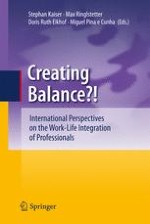
2011 | OriginalPaper | Buchkapitel
1. Integrating Professional Work and Life: Conditions, Outcomes and Resources
verfasst von : Cornelia U. Reindl, Stephan Kaiser, Martin L. Stolz
Erschienen in: Creating Balance?
Verlag: Springer Berlin Heidelberg
Aktivieren Sie unsere intelligente Suche, um passende Fachinhalte oder Patente zu finden.
Wählen Sie Textabschnitte aus um mit Künstlicher Intelligenz passenden Patente zu finden. powered by
Markieren Sie Textabschnitte, um KI-gestützt weitere passende Inhalte zu finden. powered by